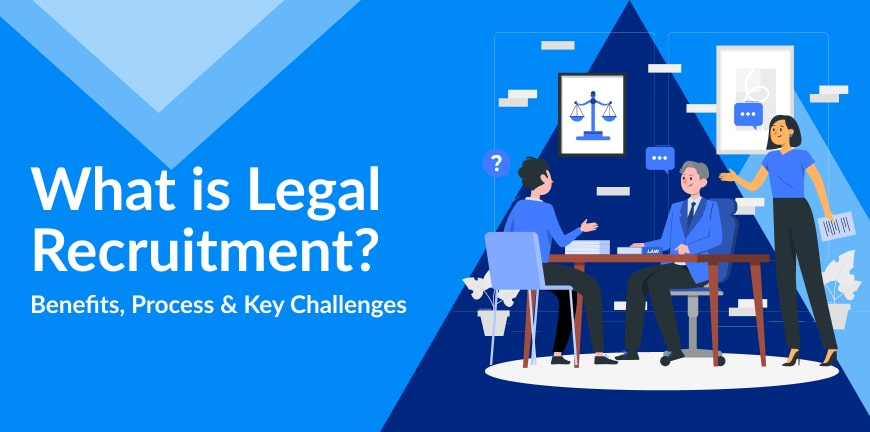
What are VMS and MSP Staffing? Key Differences, Benefits
02/04/2025
What is POSH Compliance? Benefits, Impact, and Best Practices
07/04/2025- What is Legal Recruitment? Meaning and Definition
- What is the Legal Recruitment Process?
- What are the Benefits of Legal Recruitment?
- What are the Key Challenges in Legal Recruitment?
- What are the Best Practices for Effective Legal Recruitment?
- Are you Looking for a Legal Recruitment Partner?
- Frequently Asked Questions (FAQs)
Legal Recruitment is essential in the legal industry, as it helps law firms and organizations find the right talent to take their operations forward. This could be associates, lawyers, paralegals, partners, or professionals for other specialized roles. Legal recruitment is instrumental for companies to attract and retain top-tier candidates.
What is Legal Recruitment? Meaning and Definition
Legal Recruitment meaning is recruiting legal professionals like lawyers and paralegals for law firms and organizations. The process involves sourcing, screening, running background checks to finally onboarding the candidates. Legal recruiters who recruit candidates for laws firms act as intermediaries between employers and job seekers to ensure a seamless and efficient hiring process. With their deep understanding of the legal industry and the job market, they recruit candidates with relevant skills and experience required for legal roles.
What is the Legal Recruitment Process?
The legal recruitment process is meticulous, complex and involves several steps, aimed at ensuring the right candidates are selected for the job. The legal hiring process involves e the following steps-
1. Identifying Potential Candidates
The first step in the legal hiring process involves identifying potential candidates. With access to a vast pool of candidates and posting job openings on online platforms, legal recruiters utilise different strategies to find professionals with the right qualifications. Legal recruiters have a deep knowledge about the industry, and with extensive research and networking they identify not just active but passive candidates as well.
2. Screening and Interviewing
Upon identifying potential candidates, legal recruiters proceed to conduct extensive screening to filter out the most fit candidates. The screening process involves reviewing of candidates’ resumes and other documents provided by them. The candidates are thoroughly evaluated based on their qualifications, skills, and experience.
The selected candidates are called for interviews where recruiters delve deeper into understanding their skills and experience. Thorough reference checks are conducted to validate the information candidates provide regarding the education, previous employment etc. These checks help gain valuable insight into the candidate’s performance and work ethic in the past. With all this information in hand, legal recruiters can accurately assess the candidate’s fit for the role.
3. Final Hiring Decision
The last step involves making the final decision. By carefully reviewing the information that was gathered during the screening and interview process, recruiters present a list of candidates who are the best fit for the role.
The hiring team that could include, partners, associates, and other key decision makers. They will assess the candidates based on their skill sets, experience, and cultural fit. During the assessments there will be detailed discussions to make sure the candidate not only meets the immediate needs of the firm but can also contribute to the long-term success of the organization.
Once the final decision is made, the recruiter facilitates the process of extending the job offer which could include negotiating salaries, terms and conditions and assisting with the onboarding process.
What are the Benefits of Legal Recruitment?
Legal Recruitment offers companies with a wide range of benefits like access to a larger talent pool, cost-efficient hiring services, industry expertise and many more. Additionally, legal recruiter also ensure compliance with legal regulations and provide confidential candidate information.
1. Access to Quality Talent Pool
A legal recruiter usually maintains a huge database of candidates who are pre-screened and well evaluated including individuals who are not actively searching for jobs but are open to opportunities. Companies can have the choice to choose from the best of best candidates for their various roles.
2. Cost Efficiency
Legal recruitment can be cost-effective as the legal recruiters handle resource intensive tasks associated with recruitment processes like advertising, conducting multiple interviews, etc.
3. Time efficient
By outsourcing the legal recruitment procedures to an expert legal recruiter, companies can also save time that is otherwise spent on handling the initial screening, interviewing, and negotiation processes clearing internal resources.
4. Industry Expertise
A legal recruiter has a deep understanding of the industry and several specialization areas requiring unique skills and knowledge. These areas are corporate law, intellectual property law, criminal law, family law, tax law, environmental law and many more.
5. Confidentiality
Legal recruiters understand the importance of maintaining confidentiality throughout the recruitment process, protecting both your firm and the applied roles from having sensitive information disclosed prematurely or inappropriately.
6. Compliance with Legal Regulations
Legal Recruiters have complete knowledge of compliance and its importance. They offer critical expertise to help businesses navigate the ever-complex legal landscape helping them avoid potential legal hazards during the hiring process.
What are the Key Challenges in Legal Recruitment?
With the current talent market being so competitive, legal recruiters are finding it hard to attract the right talent. Some of the common challenges in Legal recruitment are-
1. Attracting and retaining the right talent
Some of the reasons why it is difficult to attract the right talent are the dearth of skilled legal talent, finding individuals who have passed the bar to practice in the present state and other states that you are operating in. This creates a limited pool of talent to choose from. Even when you do find a candidate who has all the qualities on your checklist, hiring the one who can keep up your company reputation is not easy.
2. Tech proficiency
Most times it so happens that either your law firm is not keeping up with current technology trends or lawyers looking for jobs do not have the skills with respect to the most current technological advancements. Of course, investing in technology can help but that will be more of an ongoing initiative which smaller firms cannot afford.
3. Employee Retention
It isn’t easy for lawyers to retain clients. But it is extremely crucial to do so while acquiring new clients. Keeping up with these expectations are not easy and it may disrupt work-life balance of employees. If your employees do not see opportunities growth, retaining them can get quite difficult.
What are the Best Practices for Effective Legal Recruitment?
Here are some carefully curated tips with insightful human centric approaches to ensure effective legal recruitment.
1. Strategic talent mapping
Understand other elements of candidates, beyond their skills and experience, what are their career aspirations? Do they align with your client’s values and mission? Whether it is diversifying the team, enhancing the firm’s expertise in a flourishing area of law, or building a pipeline of future leaders, your objectives must be clear, measurable, and ambitious.
2. Enhanced employer branding
Enhancing your client’s brand reputation can help position their firm as the go-to for a particular specialty. The employer brand must reflect the business’s unique selling propositions whether it is intellectual property, environmental law, or corporate litigation.
3. Define clear job descriptions
Highlight specific attributes about the position you want to hire and how they align with the interests and skills of your ideal candidate. This can help you understand the role’s impact on the firm and the clients.
4. Leverage technology
Customer relationship management (CRM) along with an ATS can help streamline the legal recruitment process, foster candidate engagement, and build a talent pool that can be tapped into as and when you need.
5. Personalized candidate experience
Make sure that the candidate feels important during the entire cycle of the recruitment process. You may use data and technology, like candidate tracking systems and personalized communication tool to analyse a candidate’s information and help you send them tailored messages and opportunities.
6. Insight driven recruitment
Behavioural data through predictive analytics is the new frontier. By analysing candidate behaviour patterns, recruiters can gain significant insights. These can reveal what they prefer, what motivates them, and their potential fit for a role.
Are you Looking for a Legal Recruitment Partner?
Legal recruitment is a process that demands deep understanding of the legal industry, effective communication, good networking skills, and the ability to navigate challenges effectively. Legal recruiters are crucial as they are intermediaries who connect law firms with the right talent, shaping the future of legal teams.
If you are looking for a legal recruitment partner to stay ahead of industry trends and find top talent, Alp Consulting can help. Our years of experience in the recruitment industry and rich network of connection enable us to recruit the best talent for your law firm and contribute to the success of legal teams.
Frequently Asked Questions (FAQs)
1. What is legal recruitment?
Legal Recruitment meaning recruiting legal professionals like lawyers and paralegals for law firms and organizations. The process involves sourcing, screening, running background checks to finally onboarding the candidates.
2. What types of roles do legal recruiters usually fill?
Legal recruiters specialize in filling various legal positions including lawyers, paralegals, legal administrative positions, in-house legal counsel, and other specific legal specializations.
3. How does legal recruitment differ from general recruitment?
Legal recruitment differs from general recruitment by focusing on specialized legal skills and experience, requiring in-depth knowledge of the legal industry, and often involving discreet searches and a focus on cultural fit within law firms or corporate legal departments.
4. What are the benefits of using a legal recruiter?
Some of the key benefits of using a legal recruiter are- access to a skilled talent pool, lesser risk of bad hires, compliance management, time and cost efficiency, industry experience and confidentiality throughout the hiring process.
5. What challenges do legal recruiters face?
Legal recruiters face challenges like attracting and retaining qualified candidates, navigating a competitive job market, and ensuring efficient and ethical recruitment processes, including addressing talent shortages and evolving candidate expectations.
6. How has technology impacted legal recruitment?
Thanks to technology, legal recruiters do not have to sift through endless resumes. Online systems called ATS, and job boards now match candidates with the right jobs. Computer programs have been developed to read resumes and scan skills, experience, and keywords to find candidates fit for each job. Recruiters have access to an expansive dataset of candidates and hiring trends that lets them make smarter decisions and improve the hiring process.
Contact Us For Business Enquiry

Amit Saproo
Amit Saproo is the Head of Operations at ALP Consulting with nearly 17 years of experience in Executive Search, RPO, Leadership, and IT & Engineering recruitment. He leads nationwide recruitment programs across Technology, BFSI, and R&D domains, driving strategic hiring solutions for diverse client needs. Amit excels in building and managing high-performance teams that deliver scalable, end-to-end recruitment and consulting services.



